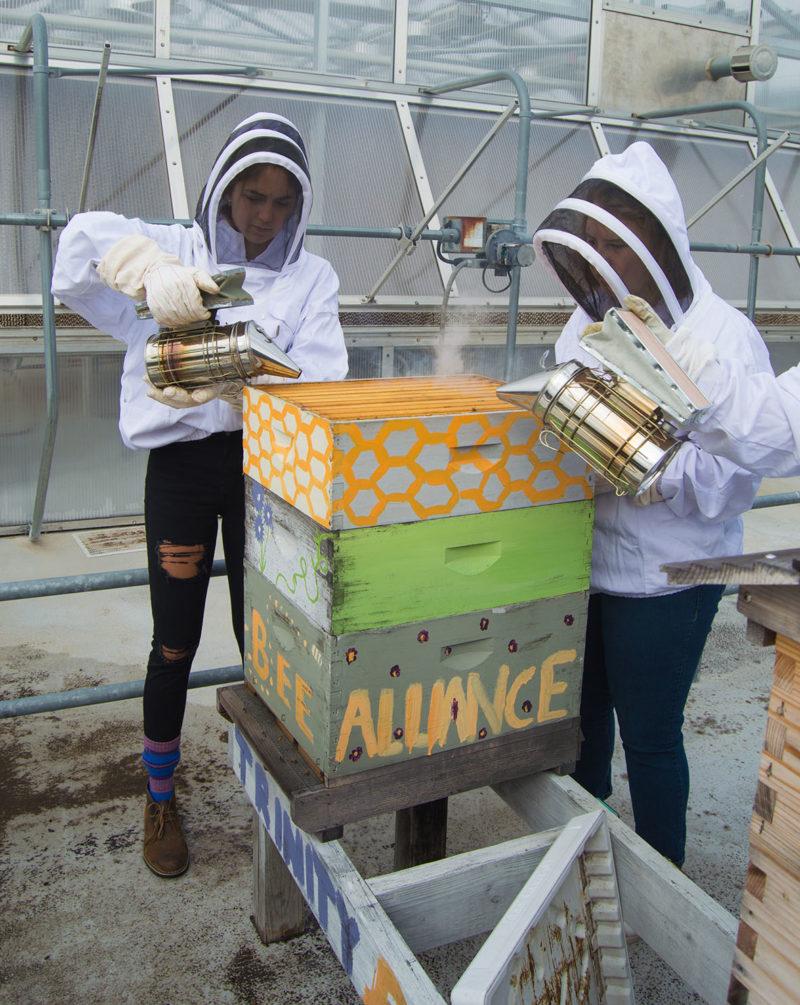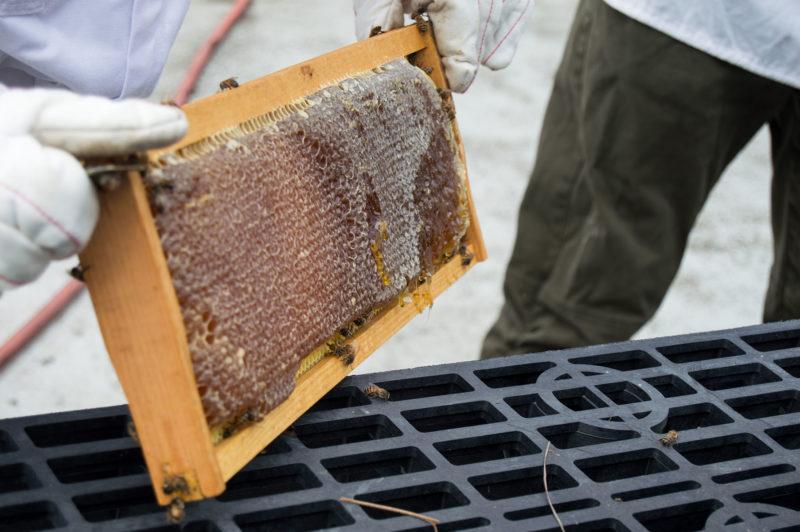The Trinity Bee Alliance gathered on the roof of the Center for Science and Innovation for their annual honey harvest. The group collected 80 small jars of honey that they will start to sell on Nov. 16.
The Bee Alliance tends to the hives year-round while promoting the importance of protecting pollinators across campus in order to maintain healthy plants and ecosystems. Abbi Bowen, president of the organization and sophomore English major, commented on this year’s harvest in comparison to last year’s.
“I would say the harvest went well. The harvest yielded 80 small jars of honey; about three times more than last year,” Bowen said. “It was more successful because we used a hand-crank honey extractor, which helped us get the most we could from such small resources. The bottling process was also way more efficient than last year because the extractor had a controllable nozzle at the bottom so we could fill the jars straight from the extractor.”
To process the honey, the Bee Alliance removes frames “” the structure of the hive that holds the honeycomb “” which are placed in an extractor. When cranked, the extractor spins the frame and the honey collects on the inside edges, which allows for faster and more efficient honey collection. The honey is then filtered and drained through a nozzle at the bottom of the extractor. Because of increased efficiency, the alliance only needed to harvest from three of the 10 frames. Bowen hopes that leaving so much honey for the bees to consume during the cooler months will allow the hives to flourish even more.
Last year, the Bee Alliance sold their honey and donated all of the proceeds to a local pollinator nonprofit, but this year’s profits may be allocated differently.
“We are planning to donate most of it to a pollinator nonprofit. However, SGA expressed that they would like us to use our profits for supplies we might need in the future so we don’t have to do funding requests from SGA for them. So at the moment the club is trying to figure out what percentage we want to donate and what percentage to use for our own supplies,” Bowen said.
Bowen also discussed her vision for the club’s future.
“In a year, I would like the club to have more events and be a greater voice on campus about environmental sustainability and campus policy,” Bowen said. “I would also like to be able to form an informative curriculum that would teach the public about beekeeping and pollinators in a more efficient and enriching way. Now that we have accomplished the goal to be more known and contribute more to campus with events and honey sales, I want us to make an effort in our community in a greater way.”
Hannah-Elyse Konyecsni, junior member of the club and environmental studies and geosciences double major, is also looking forward to the club’s increased campus impact.
“I’m most excited about the club becoming a bigger figure on campus. Every member is such a great person that everyone should have the privilege of being around. With that being said, come to our events!” Konyecsni said. “People should care about bees because we wouldn’t be here without them. If plants thrive, we thrive. It’s that simple.”
The club also wants to develop their educational programming to focus not only on bees, but all pollinators. Hannah Braley, junior club member and religion major, discussed this.

“I am looking forward to more fun educational events on campus focused not only on bees, but on all pollinators,” Braley said. “Pollinators are important. We have bees at Trinity because we are passionate about taking care of our most important pollinators and educating Trinity and the San Antonio community about the benefits of bees and beekeeping.”
Bowen also noted the importance of having pollinators on campus.
“As a university campus, we don’t have an advantage of great amounts of pollinators as we would if we were in a more rural setting. All the bees you see on campus are from our own hives; without our hives there wouldn’t really be any bees around the area. It’s also important for people to know about all pollinators and that they are just as important as bees,” Bowen said.
Bowen commented on the club’s current image as she strives to create a force of change.
“I’m worried that we are seen as a cute and pleasant club that is just that,” Bowen said. “I want people to know that there is a real cause that we are working for and that so much can be done in the community with our knowledge of beekeeping.”
Bowen also wants to see increased engagement within the beekeeping community.
“I want more people to become obsessed with bees to the point that they want to know everything and are willing to research on their own with books and websites,” Bowen said. “This is a lot to ask of people, so I don’t particularly ask this of them, but beekeeping is more than hanging out with Bee Alliance once every couple months. When someone consumes themselves with beekeeping is where the real impact can be seen.”
Jars of honey are being sold for $5. To learn more about the Bee Alliance and get involved, or to purchase honey, email Abbi Bowen at [email protected].







